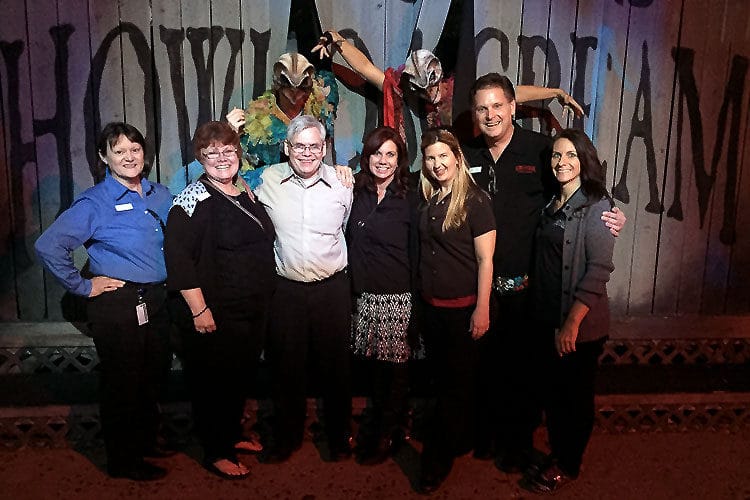By Ricky Brigante, Edited by Staff
What follows is a summary of Ricky Brigante’s keynote given at the 2017 Haunted Attraction Symposium, the theme for which was ‘Innovation in Interactivity.’ This symposium, sponsored by the Haunted Attraction Network and Gantom Lighting & Controls, featured six keynote talks, each themed on a different aspect of interactivity.
Allow this article and the other five in this issue of The Haunt Journal to inspire your team toward new levels of interactivity.
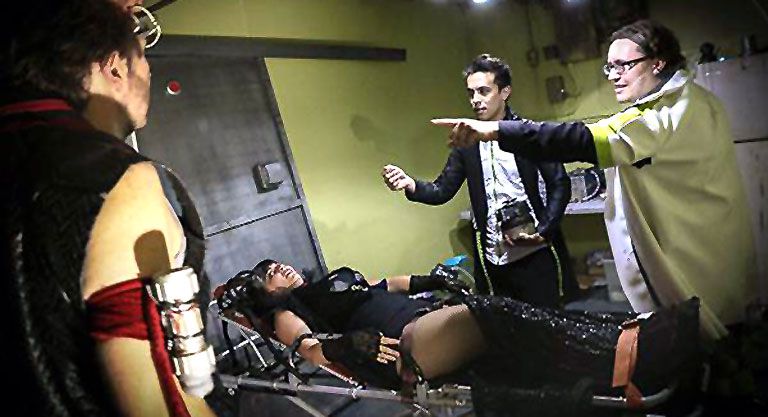
“In a world where children are practically born with smartphones in their hands, interactive design is no longer optional. But the best form of interaction isn’t found on a screen. It’s face-to-face. Themed entertainment has gotten personal. You’re no longer just telling stories but including audiences in them as the lead characters. Fully immerse your guests—or get left behind.”
“We, as humans, are unique in the world. We’re the only beings on this planet that create art—intentionally at least. I see [haunts] as a tremendous art form that has the potential to affect people, really, really deeply, as it has for me. You go into an environment, are immersed in the world, hear the sounds, and leave your worries behind for a little while. Lately, that’s become even bigger & more exciting because audiences are becoming empowered,” said Brigante.
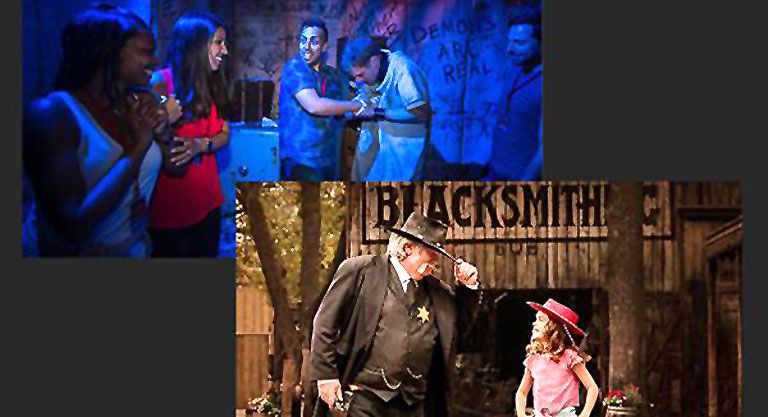
Is ‘Immersive’ Just a Buzzword, or Does It Mean Something?
“Immersion is a very primal concept, something that happens to us, even if the experience is just a good storyteller telling you a story with his mouth. If that story is told well, you’re gone, you’re in it, right? The first level of immersion is simply to make sure the story is well structured, and it works. Then you can start to build up,” said Brigante.
“We’ve entered an era in which there’s the expectation the story will surround you, that even if you turn your head, you’ll still be in the story. But immersive environments are nothing new, right? Wrong. I’m here to tell you that everything in the world we know has changed—very recently and in a big way. Disney is combining a luxury resort with immersion in an authentic Star Wars environment. It invites you to live your own, dedicated, multi-day adventure in a galaxy far, far away.”
Brigante continued, “Universal Orlando’s ‘Repository’ at Halloween Horror Nights last year put out a press release that said, ‘It’s a haunt blended with immersive theater.’ These worlds are starting to come together for mainstream audiences. We’re starting to define what it means to have an empowered audience, to give the audience control over what they’re doing. ‘Sleep No More’ and ‘Then She Fell’ are immersive theater experiences in New York. ‘Terror Behind the Walls’ is mind-blowing. Last year, ‘Tension’ was an experience that used a tremendous amount of personalization. And, of course, ‘Creep’ does a fantastic job of really drawing people into their weird little world.”

The Key to Audience Engagement is Empowerment
“Interactivity comes down to empowerment—making each member of the audience feel important. Let’s go deeper into a few examples of how being empowered affected me and how I learned that empowering an audience creates experiences that are deeply and emotionally affecting. The very first time I felt that was some years ago at ‘Black Out.’ Here’s the scene: Imagine stepping into a back alley in middle-of-nowhere Los Angeles. You go through this metal door with no idea about what you’re getting into and find yourself in this insane, weird, crazy, claustrophobic experience that lasts thirty minutes. In the end, I find myself in this small room, smelling mulch on the ground, with a nude girl chained on the floor, groveling before me. A hulking man hands me a gun—a cold, metal, real gun, very heavy—and tells me to shoot her.”
He continued, “This ‘Black Out’ journey was all about choice. Along the way, you get to choose A or B, left or right, up or down, and your choices affect where your experience goes. Somewhere I made a choice that resulted in this nude, captive girl in front of me, and I was holding a gun and being told to shoot her. It’s a powerful thing when you give people an experience like that. I had a choice at that moment to pull that trigger and shoot her. I didn’t. I made the moral choice, even in the context of entertainment, because I felt her raw emotion coming at me. I felt empowered at that moment, and I honestly felt bad for getting her to that point,” admitted Brigante.
“I was stuck with those feelings for a while. I thought, ‘What did I choose to make me do that?’ I talked to other people [who went through that haunt], and they had different experiences. That was new, that was different,” he said.

Brigante then expanded a little on his company, Pseudonym Productions. “I took all the knowledge I gained working with so many people over the years and created some fascinating experiences over the last couple of years that involved how to empower your audience best. Our biggest production yet was called ‘When Shadows Fall.’ We had 14 actors every night, and every single person that came through had a storyline, their own choices. But, their choices didn’t only affect their story; they affected the story of everyone around them. This played out over two hours and culminated in a finale. People loved it. We approached this with a very guest-centric design: What do you feel, what do you see, what do you touch, how will you be rewarded, what do you feel you accomplished as you were going through?”
Brigante continued, “How did we do that? Step one is understanding why you’d want to empower your audience. The reasons are: to give people this deep emotional connection with what you do, to make sure people aren’t just sitting there passively but are absorbed and have a sense of control. To get there—and I think Margee alluded to this—you have to get people in the right mindset,” he said.
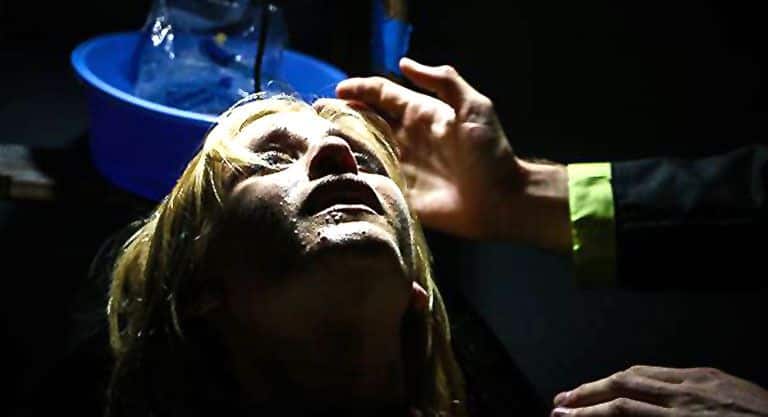
Learning from What Doesn’t Work
“We created a society called Penumbra, and we welcomed people in as new citizens of this society. In the beginning, that’s all we did. It didn’t work. People didn’t get it. Guests need a bit of a transition. Thus we redid our whole entry sequence. Up front, we told them the rules and gave them game manuals that spelled it out. We send guests down a long, dark hallway one at a time. They meet one of our characters in this hallway who says, ‘Are you ready to leave your life on the outside and join the society?’ If the people were joking around or acting stupid or if they said no, we’d send them right back out. Not until they said yes and they were in the right mindset to participate and engage would we let them in, because we knew they were prepared to be on the path toward empowerment,” he explained.
Preparing people to be emotionally available is critical. “One key is getting players to calm down. We developed a phrase, ‘Show restraint,’ to use during an experience—in the story, in character, so it doesn’t break the action—to calm down a player who’s doing something way over the line. An actor turns to them and says, ‘Hey, maybe show a little restraint,’ and then goes right back to what he or she was doing. Players could do this with each other, and it worked well. Even actors could do that with each other, to have that negotiation,” he said.

“Moving to ‘When Shadows Fall,’ we needed a more guided structure up front to evolve the story (as Scott referenced). We had a few orientation videos in our story and lots of exposition with actors in smaller and smaller groups. We sent people out on short missions: ‘Do this by yourself and come back to me. Tell me how that went and let me know how you made it along your way.’ Once we were sure they were okay being on their own, it was time to make them the star of the show,” said Brigante.
“This is where empowerment comes in. There’s nothing more important when it comes to these interactive, immersive experiences than to make every single guest feel like it’s all just for them. I don’t care if there are two people, 50 people, 100 people, or 6,000 people in there, if every person can walk away feeling like they’re the most important person in this entire thing, that everything happened because of them, they’re going to leave feeling amazed.”
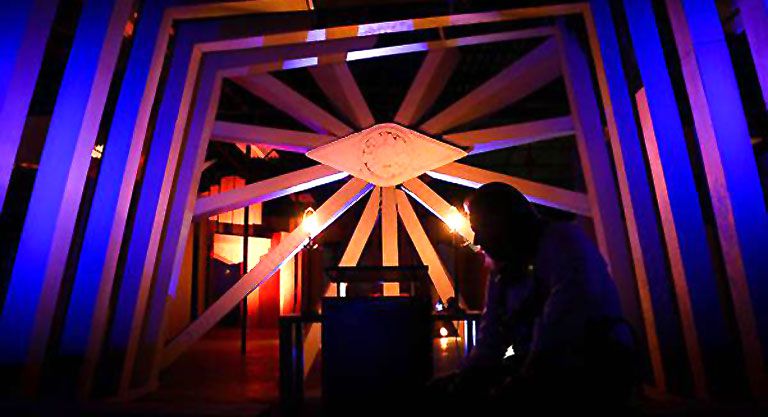
Choices Require Consequences to Be Meaningful and Memorable
“If you’re going to enable your guests to have choice, to have agency, to have control over this experience, you better have consequences for them. I mean that both good and bad,” he advised. “We had a system in which choices very clearly resulted in a reaction. You need a path for people to follow and allow them to make choices. Once you have that, you can mess with them a little bit.”
Brigante explained, “I’m going to tell you about our Halloween experience ‘Catharsis.’ We started by weirding people out, cuddling with them, stuff like that. We found we hadn’t pushed the boundaries far enough. People wanted more. So we followed up with our guests and tried to personalize the experience even further. We had a theme of the seven deadly sins and sent out a questionnaire to our players who’d participated. We asked them questions like, ‘What secret desire have you never fulfilled?’ or ‘What sin tempts you the most, and would you act on it if tempted?’ We got one particularly interesting response from a person who wanted to go down a path of lust. We had no intention of doing what she asked because it would be absurd, but we wanted her to think we were going to do it. When she came in, we pulled her off to the side in the dark, and started going down the path of what she thought she was going to get—the expectations we’d laid out. She’d made this choice to do some bizarre things, and she felt in control. We took a turn, let’s just say, and she ended up using the safe word after five minutes. Two weeks later, on our Facebook page, she left a five-star review. I’m not going to read the whole thing here, but a highlight was, “I came out questioning absolutely everything I thought I knew about myself. I hadn’t quite steeled myself for the possibility that ‘Catharsis’ would do exactly what it said it would.’”

In conclusion, Brigante observed, “When you empower someone, you open up all these fascinating new doors about what you can achieve in connecting with an audience. Let me share one last story: On our final night in our last-scene finale, our two biggest repeat players got engaged right on our set. That’s how much they loved what we were doing. That’s how connected they were with our story and our world. They wanted it to go on forever, and they wanted to move in and live there. What they did was the next best thing. One member of the pair had visited the attraction 12 times in 10 weeks, which was beautiful. Their engagement was a bonding experience, a great way to wrap up. They can’t wait for us to do the next adventure.
That connection is what can come out of having an audience that feels important and empowered. It’s not just the ‘Hey, we did a thing, it was fun, and now what are we doing next?’ No, they’re going to linger in this for days and days and days. It’s theater, good theater, and it leaves you asking questions, leaves you thinking about it for a long time.”
Key Takeaways:
- Immersion is a very primal concept, something that happens to us, even if the experience is just a good storyteller telling you a story with his mouth.
- Agency is critical for interactivity. When you enable your guests to have choice, you better have consequences for them (both good and bad).
- The reasons we want to empower are audience are: to give guests a deep emotional connection with the story; to ensure guests aren’t sitting passively but are absorbed and have a sense of control; to foster a longer guest relationship
- Preparing people to be emotionally available is key.
- Every single guest should feel like it’s all just for them.
About the Speaker:
Ricky Brigante
Ricky Brigante is an immersive entertainment expert and founder of Inside the Magic, a respected source of themed entertainment news and information. After 13 years as Editor-in-Chief, Ricky sold Inside the Magic in 2018 to become a designer of immersive experiences. Now, as Vice President and Creative Technologist at Pseudonym Productions, Ricky helps create uniquely interactive entertainment that entices audiences to push boundaries and question reality. After four years of creating physical and digital experiences in Orlando, Los Angeles, and New York, Pseudonym recently moved to Philadelphia to debut a new series of ambitious immersive experiences.


